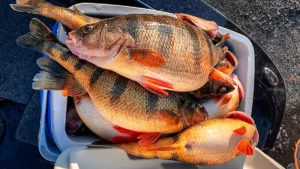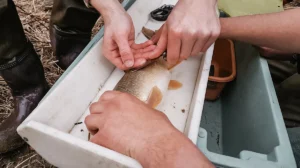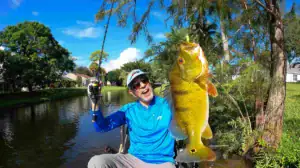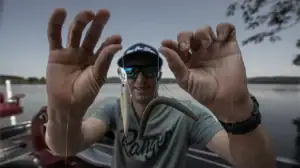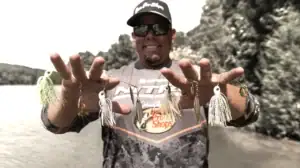Prespawn Great Lakes smallmouth bass start sliding up on vast rock flats when water temperatures range between 40- to 50-degrees. Bass staging for the spawn are often spread out, so Bill McDonald opts to fish small swimbaits with a steady retrieve, which speeds his search over slower moping baits like a tube.
TACKLE & GEAR
- SWIMBAIT – Strike King Rage Swimmer: https://wired2.fish/rageswimmer
- JIG – Hayabusa Beat Roller Ball Jig Heads
- ROD – Lew’s Team Custom Pro Mark Rose Ledge Spinning Rod
- REEL – Lew’s Custom Pro Speed Spin Spinning Reel
- LINE (braided mainline) – Seaguar Smackdown Flash Green Braided Line, 20-pound
- LINE (leader) – Seaguar Tatsu Fluorocarbon, 8-pound
- OTHER GEAR – Rapid Fishing Solutions Rapid Hook All
- FISH FINDER – Garmin GPS MAP XSV
- TROLLING MOTOR – Minn Kota Ultrex Trolling Motor
Bill relies on letting the fish tell him how they want the swimbait presented by paying close attention to his retrieve. With every bite, he reflects on what he did to make that fish react and replicates this. Generally speaking, McDonald always casts and lets the bait sink straight to the bottom, then engages the bait on a slow and steady retrieve. He periodically stops the swimbait and ball head jig combo to regain bottom contact, keeping the lure on or near the bottom. Set the hook if you feel anything different and out of the ordinary.
Lastly, McDonald stresses the importance of recording a track on your fish finder map as you drift or troll while making sure to drop a waypoint when you contact a fish (catch or miss). Doing so allows you to either duplicate a productive pass, make targeted casts to groups or individual fish relating to specific spots (as indicated by the waypoint), or covering new water after an unproductive drift (don’t follow the same track).
Check out our Wired2fish Swimbait Tips Channel for more swimbait content!


![[VIDEO] Greg Hackney’s Formula for Post-Spawn Bass Success](https://www.wired2fish.com/wp-content/uploads/2025/05/Hackney_Post-Spawn_Bass-300x169.webp)
![[VIDEO] Scanlon’s Guide for Stained Water Spawning Bass](https://www.wired2fish.com/wp-content/uploads/2025/05/scanlon-jig-300x169.webp)
![[VIDEO] Seth Feider’s Prespawn Jig Pattern Explained](https://www.wired2fish.com/wp-content/uploads/2025/04/prespawn-jig-300x169.webp)
